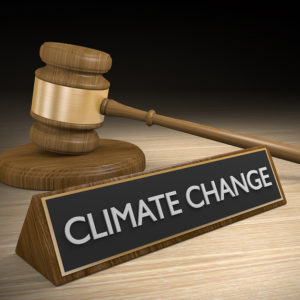Climate change has many consequences. It can result in flooding, increased storms and droughts. And climate change also causes lawsuits.
Over the last few years, an increasing number of lawsuits have been brought, primarily against energy companies, seeking to make them pay because their products cause climate change. Some of these suits have been brought by states or localities, claiming that they will suffer damage due to the effects of a warmer world. Others have been brought as class actions.
The Supreme Court recently rejected attempts by some oil companies to have pending climate lawsuits moved from state to federal courts. The decision is considered a blow to the companies, as some state courts have a reputation for being more open to speculative liability theories and large damage awards than what is likely in the federal system.
We are already starting to see plaintiffs take advantage of this new opening. In June, Multnomah County, Oregon, filed suit against a wide variety of oil and coal companies, alleging that emissions from their companies’ activities exacerbated a 2021 heat wave that led to 69 deaths in the county.
But environmentalists shouldn’t be popping open their champagne bottles yet. These lawsuits still face perhaps insurmountable legal challenges. Whether they succeed or fail, they aren’t the right way of pursuing action on climate change.
Winning a climate lawsuit requires more than simply showing that fossil fuels emit greenhouse gasses that warm the planet. There are a variety of procedural and substantive challenges that such suits must overcome. For example, most states contain a statute of limitations that prevents plaintiffs from recovering for harm due to actions in the distant past. Yet, in the case of climate change, the bulk of the energy company emissions and conduct at issue occurred many decades ago, far beyond the statute of limitations period.
Climate suits also face tough substantive problems. For example, the Oregon lawsuit involves a long chain of causation between emissions that occurred many decades ago and a particular heat wave. Establishing a proper connection between those two events sufficient for legal liability is no easy task.
Or consider another example. An increasing trend is for suits to rely on the “public nuisance doctrine,” an old common law doctrine that allows governments to sue for actions that infringe on public rights rather than cause harm to them or specific parties. As with many common law claims, the public nuisance doctrine was developed before the institution of the modern regulatory state. Today, by contrast, almost every area of the economy and the environment is governed by elaborate statutory and regulatory frameworks, including the development and use of fossil fuels. For a court to invoke the public nuisance doctrine concerning greenhouse gas emissions would undermine these frameworks, and judges may be rightly wary of usurping the prerogatives of the other branches of government in this way.
Unsurprisingly, climate lawsuits have not had a good court track record. In 2011, the Supreme Court, in an 8-0 opinion delivered by Justice Ruth Bader Ginsburg, held that manufacturers and energy companies could not be sued for greenhouse gas emissions under federal law. In 2021, the U.S. Court of Appeals dismissed one of the recent cases, saying there is no legal or factual foundation for them.
Climate activists haven’t given up, of course. But even if some climate-related lawsuits could overcome every legal hurdle, it would still be worth asking whether litigation is the best way to deal with the risks and costs of climate change. Understandably, some would be frustrated by what they see as the slow pace of governmental action on climate and would seek to use the courts as an end-run around the political system. But that doesn’t make it right.
The reality is litigation is a poor vehicle for dealing with the complexities of climate change. Lawsuits can work to settle disputes between a discrete set of parties. But in the case of climate change, everyone emits and benefits from the emission of greenhouse gasses, and we all are harmed by the effects of climate change in various ways. Litigation is unable to make the trade-offs and compromises necessary to deal with the issue. Doing that requires the messy business of politics.

